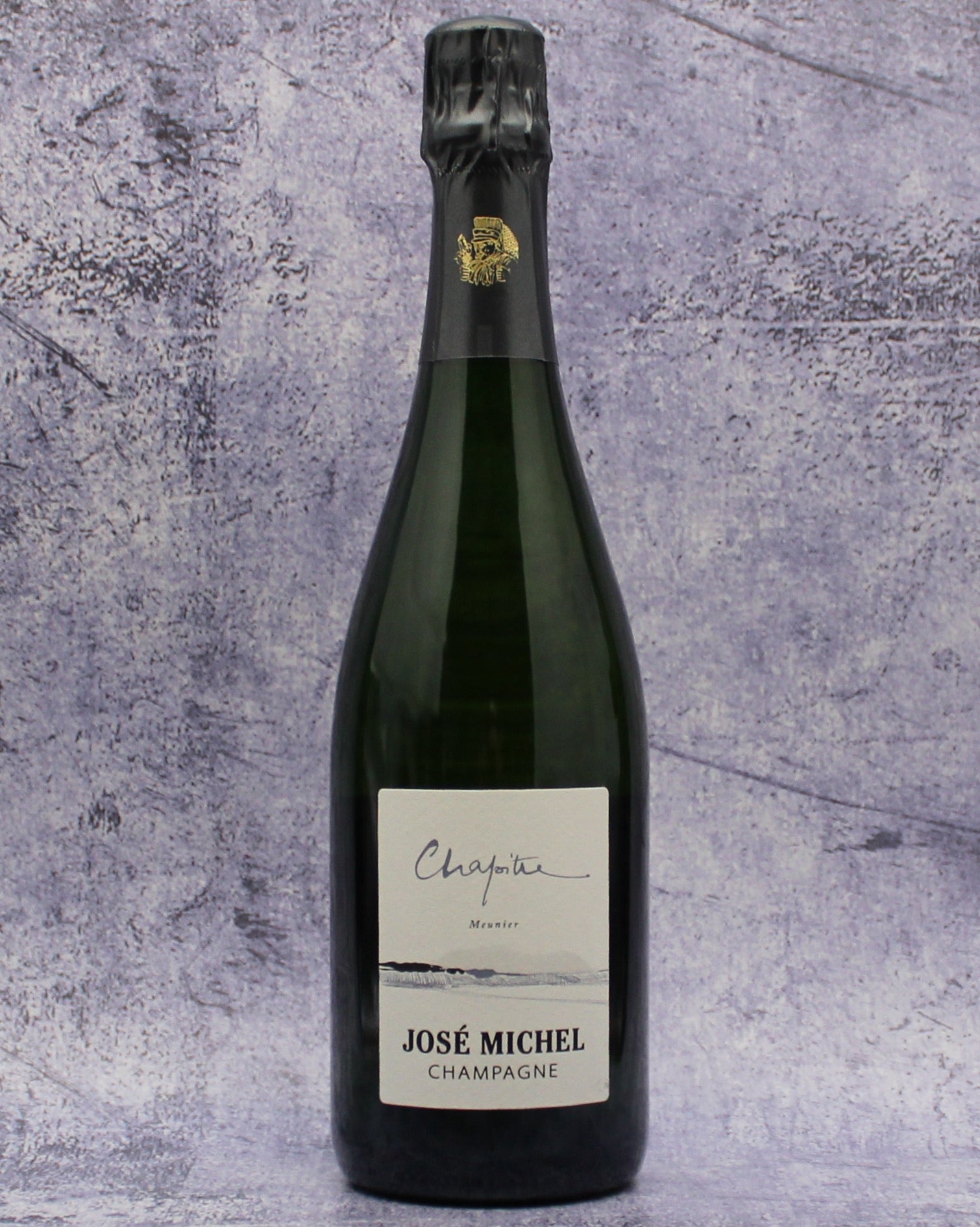Description
From: Moussy (Cotes D'Epernay), Champagne, France
Varietal: Pinot Meunier
This wine. Notes: "Chapter" Pinot Meunier Brut NV
“Chapter” Pinot Meunier Brut NV The “Chapter” Meunier non-vintage brut base vintage is 90% 2021 blended with 10% 2020, which are kept in oak barrels. Once blended, the wine remains in 57% stainless steel and 43% oak (600-liter barrels). Dosage is 3-4g/l. With this cuvée, Antonin Michel seeks to express the essence of the Meunier grape, it's vinous fruitiness and drinkability.
Taste: Newly labeled and officially under Antonin, José Michel’s grandson, “Chapitre” takes the spot of the old labels’ Pinot Meunier Brut. “Chapitre,” or “Chapter,” is a non-vintage blend highlighting Pinot Meunier's charming drinkability. Similarly to the “Prémices” entry-level cuvée, this also carries a lower dosage than previous vintages. This move matches the perfectly ripened fruit while holding to the quality level the house has become known for. Upon the first pour, citrus, kumquat, and persimmon meet taut raspberry, vanilla honey toast, and a chalky undertone take the lead. With a few minutes of air, those taut flavors and aromas turn to stone fruit and richer red fruits. Apricot confiture over warmed pastry meets red fruit compote and cinnamon brioche. As this champagne continues to open, you’ll find plush notes of bing cherry, raspberry, currant, and maraschino cherry with a lingering note of marzipan, a gentle acidity that keeps everything clean and fresh, and a lingering, chalky finish that’ll immediately invite you to take another sip. - E. Lyman, Champion Wine Cellars, November 2024.
Pairing: You’ve got a lot of options with this champagne. Roasted turkey or chicken, pork, roasted duck, mushrooms, or grilled vegetables all pair wonderfully with Pinot Meunier champagne. Some specific examples include serving this with honey-and-soy-glazed chicken thighs, roasted chicken or turkey with orange and sage, pork katsu, brined pork chops with fennel (check it out below), Chinese roast pork on garlic bread, mushroom stroganoff/risotto/polenta, crispy mushroom focaccia, mushroom bread pudding, and pork or duck Rillettes.
Brined Pork Chops With Fennel
By David Tanis
About. Champagne José Michel, located in the village of Moussy, just south of Épernay in the Marne Valley, is one of the few family-run houses that emphasizes tradition while integrating modern techniques. The house has a long history, rooted deeply in the rich soils of Champagne, and its origins date back to the 19th century. The family has been cultivating vines since 1847, though José Michel formally established the Champagne house as it is known today in 1955.
The vineyards of José Michel span approximately 11 hectares, with most of the holdings located in Moussy and the surrounding villages. The terroir is quintessentially Marne Valley, with clay-limestone soils that are particularly well-suited to Pinot Meunier, the grape that has become the hallmark of this estate. Pinot Meunier thrives in this subregion's more excellent, damp conditions, where its late-budding and early-ripening characteristics make it less susceptible to frost and other climatic challenges.
The winemaking at José Michel is now led by José’s grandson, Antonin, who upholds the family’s traditional practices while embracing sustainable and progressive viticultural techniques. A defining characteristic of the estate is its staunch commitment to Pinot Meunier, a grape often overshadowed by Chardonnay and Pinot Noir in the Champagne region. At José Michel, Pinot Meunier is celebrated for its ability to add fruitiness, suppleness, and vibrancy to their cuvées. This focus has earned the house a reputation as a master of Meunier, demonstrating its complexity and aging potential when cultivated and vinified with care.
The vineyards are farmed with a profound respect for the environment. José Michel was an early adopter of the principles of lutte raisonnée (sustainable viticulture), long before it became a common practice in Champagne. This approach minimizes chemical inputs and focuses on maintaining biodiversity and soil health. Cover crops are planted between the rows to prevent erosion, improve soil structure, and encourage beneficial microorganisms. In more recent years, the estate has taken steps toward organic certification, reflecting its philosophy of working in harmony with nature.
In the winery, the philosophy is to let the terroir speak for itself. The Michel family uses a mix of stainless steel and old oak barrels for fermentation, depending on the cuvée. Malolactic fermentation is generally allowed, which softens the wines and adds depth and creaminess to the palate. Aging on the lees is extended, often well beyond the minimum requirements, to build richness and complexity in the final wines. The result is Champagnes that are accessible in their youth and capable of developing remarkable nuances with age.
One of the most notable aspects of José Michel’s approach is its focus on crafting Champagnes that reflect the vintage and vineyard rather than adhering to a rigid house style. This allows the character of each growing season to shine through, resulting in cuvées that are genuinely unique expressions of time and place. However, their non-vintage blends also showcase remarkable consistency, achieved through carefully blending reserve wines stored in the family’s cellars.
The José Michel portfolio features a range of Champagnes, from their entry-level Brut Tradition to more complex single-vineyard and vintage-specific bottlings. The Brut Tradition is a vibrant and fruit-forward blend dominated by Pinot Meunier, embodying the essence of the house style. At the other end of the spectrum are wines like their Blanc de Blancs and Blanc de Noirs, which delve deeper into the nuances of specific grape varieties and vineyard sites.

